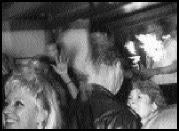STREET THEATER may get people’s attention, but can it win their votes? The Sidran Truth Squad is banking on unconventional methods—picketing mayoral candidate Mark Sidran’s campaign kickoff, passing out fliers at street fairs and parades, camping on the sidewalk at a downtown public forum—to spread its message that Sidran is bad for Seattle.
Truth Squad members, who include homeless advocates, housing activists, and representatives of organized labor, say the city attorney is a homeless- bashing, cop-apologizing opponent of civil liberties who may trick Seattle into voting him into the city’s highest office. “There are a lot of people who literally do not know the man and his politics,” says John Fox, the housing advocate who started the Truth Squad when Sidran launched his mayoral bid in May. “That’s why it’s important for us to do whatever it takes to start making people aware of what his record is and get that information out.”
But will leaflets, picket signs, and raised voices resonate with voters in next week’s primary? Cathy Allen, a Democratic consultant who isn’t affiliated with any mayoral campaign, thinks the Truth Squad’s efforts may backfire. “People see these people who [look like] young hooligans doing all these countercampaign things, and they think, ‘This town’s getting out of control; I need to go vote,'” Allen says. “The average voter is more inclined to be angry at seeing what they’re doing” than responsive to their message, she says.
In a recent poll, Sidran’s approval among likely voters 55 and older was 30 percent, four points higher than his nearest rival, Mayor Paul Schell. That number is significant because older voters typically make up the largest group of voters in off-year mayoral primary elections such as this one. In 1997, according to voter counts compiled by the election analysis firm Labels and Lists, people 60 and older made up nearly 43 percent of local primary voters. (Those numbers include only 1997 voters who are still registered, so voters who are no longer registered are not included in the total.) “When you have these kind of tactics, you need to be taking into account what the core target populations actually are,” Allen says. “Knowing the people that are going to turn out in the primary, they’re solidifying [Sidran’s] base.”
Whether the Truth Squad’s message would get through to likely Sidran voters in the first place is another question. The group’s core issues—liberal causes c鬨bres every one—run the gamut from affordable housing to poverty to labor concerns; its Web site (www.sidrantruthsquad.org) contains a lengthy “rap sheet” of Sidran’s alleged crimes. In no particular order, they include advising the City Council to repeal a low-income housing inspection law; opposing public employees’ right to strike; lashing out against Sound Transit after months of silence on its light-rail proposal; being a late convert to the monorail cause after dismissing it as futuristic hokum; pushing a car impound law that disproportionately targets the poor; and supporting “civility laws” that single out the homeless and people of color.
Mike Maloney, a union benefits administrator and Truth Squad steering committee member, witnessed the impact of Sidran’s civility laws firsthand, hanging flower baskets at night in Pioneer Square. He says laws backed by Sidran, from the “no-sitting” ordinance to the parks exclusion law, which gives police power to ban petty criminals from parks for up to a year, are selectively enforced against the city’s most vulnerable. “All he’s doing is beating up on the little guy. He’s not really changing any of the systemic problems.” Maloney says the Truth Squad’s goal is to “keep Sidran in the civility laws box, which is really where he should be, because that’s how he made a name for himself. He’s trying to break out of that box by saying he’s an opponent of Sound Transit and a friend of monorail . . . and we’re trying to prevent him from broadening his image.” Truth Squad founder Fox says Sidran’s support of monorail is an “opportunistic misrepresentation” of the candidate’s true beliefs. “I think his criticisms are a paper-thin facade to cover what, in the end, will be the same level of support” for light rail as his opponents, Greg Nickels and Paul Schell, Fox says.
Will the Truth Squad’s uphill battle result in a Sidran defeat come Sept. 18? The group, which does not endorse any candidate, is hopeful but realistic about its impact on the election. With Sidran advancing in the polls and grabbing endorsements from both daily newspapers, “we know our work is cut out for us,” Fox says. If Sidran does make it past the primary, the Sidran Truth Squad will be right behind him. “If you look at the drift of city politics over time, there has been a shift away from a more compassionate approach,” Fox says. “Sidran represents that drift, and by defeating Sidran, it sends a message to the others—the Schells, the Nickels, the people who’ve allowed Sidran to do the dirty work . . . that this community does not support the message of intolerance that he represents.”







